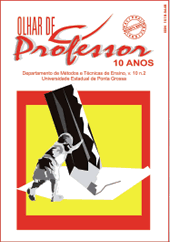A AUTO-AVALIAÇÃO COMO INSTRUMENTO DE CONSCIENTIZAÇÃO DE ALUNOS DE UM CURSO DE ESPECIALIZAÇÃO LATO SENSU
Main Article Content
Abstract
O presente artigo foi elaborado com base em estudo desenvolvido a partir de uma experiência efetivada por meio de uma prática de auto-avaliação realizada com alunos da disciplina Fundamentos da Educação, no Curso de Especialização em Docência Superior, da FAESPI (Faculdade de Ensino Superior do Piauí), instituição localizada em Teresina - PI. O estudo constou da análise do discurso de uma amostra de textos auto- avaliados produzidos por alunos do curso, selecionados e organizados em três blocos, de acordo com a participação dos alunos nas aulas e nas discussões, em um processo que teve início no primeiro dia aula, preparando-se os alunos e expondo de forma clara o objetivo que se pretendia alcançar. Fundamentado teoricamente por autores que têm uma vasta produção no campo da avaliação educacional (BLOOM, 1983; HOFFMANN, 1998; SANT’ANNA, 1995) e apresentando um sucinto passeio pela teoria da Análise do Discurso (LUKE, 2003; ORLANDI, 2005), o estudo remete ao entendimento de que uma prática de auto-avaliação, desde que orientada de forma clara em seus objetivos e finalidades, pode contribuir significativamente na aprendizagem e no crescimento pessoal dos alunos.
Downloads
Article Details
Authors who publish in this journal agree with the following terms:
a) Authors keep the copyrights and concede the right of its first publication to the magazine. The work piece must be simultaneously licensed on the Creative Commons Attribution License which allows the paper sharing, and preserves both the author identity and the right of first publication to this magazine.
b) Authors are authorized to assume additional contracts separately, to not-exclusively distribution of the paper version published in this magazine (e.g.: publish in institutional repository or as a book chapter), with the author identity recognition and its first publication in this magazine.
c) Authors are permitted and stimulated to publish and distribute their papers online (e.g.: in institutional repository or on their personal webpage), considering it can generate productive alterations, as well as increase the impact and the quotations of the published paper.
d) This journal provides public access to all its content, as this allows a greater visibility and reach of published articles and reviews. For more information on this approach, visit the Public Knowledge Project, a project that developed this system to improve the academic and public quality of the research, distributing OJS as well as other software to support the publication system of public access to academic sources.
e) The names and e-mail addresses on this site will be used exclusively for the purposes of the journal and are not available for other purposes.

This work is licensed under a Creative Commons Attribution 4.0 International License.

